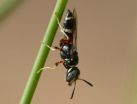(Press-News.org) COLUMBUS, Ohio – Lower levels of blood sugar may make married people angrier at their spouses and even more likely to lash out aggressively, new research reveals.
In a 21-day study, researchers found that levels of blood glucose in married people, measured each night, predicted how angry they would be with their spouse that evening.
At the end of the 21 days, people who had generally lower levels of glucose were willing to blast their spouses with unpleasant noises at a higher volume and for a longer time than those who had higher glucose levels.
The study shows how one simple, often overlooked factor – hunger caused by low levels of blood glucose - may play a role in marital arguments, confrontations and possibly even some domestic violence, said Brad Bushman, lead author of the study and professor of communication and psychology at The Ohio State University.
Blood glucose levels can be brought up most quickly by eating carbohydrates or sugary foods.
"People can relate to this idea that when they get hungry, they get cranky," Bushman said.
It even has a slang term: "hangry" (hungry + angry).
"We found that being hangry can affect our behavior in a bad way, even in our most intimate relationships," he said.
The study, which took three years to complete, appears online in the Proceedings of the National Academy of Sciences. Bushman conducted the research with C. Nathan DeWall of the University of Kentucky; Richard S. Pond of the University of North Carolina at Wilmington; and Michael D. Hanus of Ohio State.
The research involved 107 married couples. The study started with the couples completing a relationship satisfaction measure, which asked each spouse how much they agreed with statements like "I feel satisfied with our relationship."
The researchers measured anger in a unique way, developed and validated by DeWall in previous studies.
All participants were given a voodoo doll that they were told represented their spouse, along with 51 pins. At the end of each day, for 21 consecutive days, the participants inserted 0 to 51 pins in the doll, depending on how angry they were with their spouse. They did this alone, without their spouses being present, and recorded the number of pins they stuck in the doll.
Each person also used a blood glucose meter to measure glucose levels before breakfast and every evening before bed for the 21 days.
The result: The lower the participants' evening blood glucose levels, the more pins they stuck in the doll representing their spouse. This association was present even after the researchers took into account the couples' relationship satisfaction.
"When they had lower blood glucose, they felt angrier and took it out on the dolls representing their spouse," Bushman said.
"Even those who reported they had good relationships with their spouses were more likely to express anger if their blood glucose levels were lower."
But it wasn't just the dolls who took the brunt of the anger. After the 21 days, the couples came into the laboratory to take part in an experimental task.
They were told they would compete with their spouse to see who could press a button faster when a target square turned red on the computer – and the winner on each trial could blast his or her spouse with loud noise through headphones.
In reality, though, they weren't playing against their spouse – they were playing against a computer that let them win about half the time.
Each time they "won," the participants decided how loud of a noise they would deliver to their spouse and how long it would last. Their spouses were in separate rooms during the experiment, so participants didn't know they weren't really delivering the noise blast.
"Within the ethical limits of the lab, we gave these participants a weapon that they could use to blast their spouse with unpleasant noise," Bushman said.
Results showed that people with lower average levels of evening glucose sent louder and longer noise to their spouse – even after controlling for relationship satisfaction and differences between men and women.
Further analysis showed that those who stuck more pins in the voodoo doll representing their spouse were more likely to deliver louder and longer noise blasts, as well.
"We found a clear link between aggressive impulses as seen with the dolls and actual aggressive behavior," he said.
Why does low blood sugar make people more prone to anger and aggression?
Bushman said that glucose is fuel for the brain. The self-control needed to deal with anger and aggressive impulses takes energy, and that energy is provided in part by glucose.
"Even though the brain is only 2 percent of our body weight, it consumes about 20 percent of our calories. It is a very demanding organ when it comes to energy," he said.
"It's simple advice but it works: Before you have a difficult conversation with your spouse, make sure you're not hungry."
INFORMATION:
The research was funded by a grant from the National Science Foundation.
Contact: Brad Bushman
(614) 688-8779
Bushman.20@osu.edu
Written by Jeff Grabmeier
(614) 292-8457
Grabmeier.1@osu.edu
Lashing out at your spouse? Check your blood sugar
Study finds that 'hangry' husbands and wives get more aggressive
2014-04-14
ELSE PRESS RELEASES FROM THIS DATE:
Ferns borrowed genes to flourish in low light
2014-04-14
DURHAM, N.C. -- During the age of the dinosaurs, the arrival of flowering plants as competitors could have spelled doom for the ancient fern lineage. Instead, ferns diversified and flourished under the new canopy -- using a mysterious gene that helped them adapt to low-light environments.
A team led by Duke University scientists has pinpointed the curious origins of this gene and determined that it was transferred to ferns from a group of unassuming moss-like plants called hornworts. The findings were announced today, April 14, in the Proceedings of the National Academy ...
Plugging an ozone hole
2014-04-14
CAMBRIDGE, Mass-- Since the discovery of the Antarctic ozone hole, scientists, policymakers, and the public have wondered whether we might someday see a similarly extreme depletion of ozone over the Arctic.
But a new MIT study finds some cause for optimism: Ozone levels in the Arctic haven't yet sunk to the extreme lows seen in Antarctica, in part because international efforts to limit ozone-depleting chemicals have been successful.
"While there is certainly some depletion of Arctic ozone, the extremes of Antarctica so far are very different from what we find in the ...
Fire and drought may push Amazonian forests beyond tipping point
2014-04-14
Falmouth, Mass. – Future simulations of climate in the Amazon suggest a longer dry season leading to more drought and fires. Woods Hole Research Center scientists Michael Coe, Paulo Brando, Marcia Macedo and colleagues have published a new study on the impacts of fire and drought on Amazon tree mortality. Their paper entitled “Abrupt increases in Amazonian tree mortality due to drought-fire interactions,” published in the Proceedings of the National Academy of Sciences, found that prolonged droughts caused more intense and widespread wildfires, which consumed more forests ...
Faithful allies since the Cretaceous
2014-04-14
Like humans, many animals depend on beneficial microbes for survival. Although such symbioses can persist for millions of years, the factors maintaining their long-term stability remain, in most cases, unknown. Scientists from the Max Planck Institute for Chemical Ecology and the University of Regensburg, in collaboration with researchers in the USA, now discovered that certain wasps tightly control mother-to-offspring transmission of their bacterial symbionts. This stabilizes the symbiotic alliance and contributed to its persistence over the past 68-110 million years. ...
'Problem wells' source of greenhouse gas at unexpected stage of natural gas production
2014-04-14
WEST LAFAYETTE, Ind. - High levels of the greenhouse gas methane were found above shale gas wells at a production point not thought to be an important emissions source, according to a study jointly led by Purdue and Cornell universities. The findings could have implications for the evaluation of the environmental impacts from natural gas production.
The study, which is one of only a few to use a so-called "top down" approach that measures methane gas levels in the air above wells, identified seven individual well pads with high emission levels and established their stage ...
Penicillin redux: Rearming proven warriors for the 21st century
2014-04-14
Penicillin, one of the scientific marvels of the 20th century, is currently losing a lot of battles it once won against bacterial infections. But scientists at the University of South Carolina have just reported a new approach to restoring its combat effectiveness, even against so-called "superbugs."
Bacteria have been chipping away at the power of the penicillin family of drugs since their first wide-scale use as antibiotics in the 1940s. For example, the staph infection, brought about by the bacterium Staphylococcus aureus, was once readily treated with penicillin and ...
Study links severe sleep apnea to increased risk of stroke, cancer and death
2014-04-14
DARIEN, IL – A new study shows that moderate to severe obstructive sleep apnea is independently associated with an increased risk of stroke, cancer and death.
Results of the 20-year follow-up study show that people with moderate to severe obstructive sleep apnea were four times more likely to die (hazard ratio = 4.2), nearly four times more likely to have a stroke (HR = 3.7), three times more likely to die from cancer (HR = 3.4), and 2.5 times more likely to develop cancer. Results were adjusted for potential confounding factors such as body mass index, smoking status, ...
Shared decision making during radiation therapy improves patient satisfaction
2014-04-14
PHILADELPHIA—Playing an active role in their radiation treatment decisions leaves cancer patients feeling more satisfied with their care, and may even relieve psychological distress around the experience, researchers from the Perelman School of Medicine at the University of Pennsylvania report in the journal Cancer.
In a study of 305 patients undergoing radiation treatment, Neha Vapiwala, MD, an associate professor in the department in Radiation Oncology at Penn Medicine, and colleagues at link "Penn's...Center: Penn's Abramson Cancer Center found an association between ...
Plague alters cell death to kill host
2014-04-14
Northwestern Medicine scientists are continuing to unravel the molecular changes that underlie one of the world's deadliest and most infamous respiratory infections.
When the bacterium Yersinia pestis enters the lungs, it causes pneumonic plague, a disease that is 100 percent fatal if untreated. The way in which Y. pestis evades the immune system and kills people in a matter of days has largely confounded scientists, until now.
Following a 2007 study demonstrating that the presence of a protein called the plasminogen activator protease (Pla) is required for Y. pestis ...
Climate change a likely culprit in coqui frog's altered calls, say UCLA biologists
2014-04-14
Changes in the Puerto Rican climate over the past three decades have caused small but significant changes to the coqui frog, the territory's national animal. UCLA biologists have found that not only have male coquis become smaller, but their mating call has also become shorter and higher pitched.
Authored by Peter Narins, UCLA distinguished professor of integrative biology and physiology and of ecology and evolutionary biology, and Sebastiaan Meenderink, a UCLA physics researcher, the study examined 170 male coqui frogs (Eleutherodactylus coqui) in 1983 and then 116 ...
LAST 30 PRESS RELEASES:
Study reveals insights about brain regions linked to OCD, informing potential treatments
Does ocean saltiness influence El Niño?
2026 Young Investigators: ONR celebrates new talent tackling warfighter challenges
Genetics help explain who gets the ‘telltale tingle’ from music, art and literature
Many Americans misunderstand medical aid in dying laws
Researchers publish landmark infectious disease study in ‘Science’
New NSF award supports innovative role-playing game approach to strengthening research security in academia
Kumar named to ACMA Emerging Leaders Program for 2026
AI language models could transform aquatic environmental risk assessment
New isotope tools reveal hidden pathways reshaping the global nitrogen cycle
Study reveals how antibiotic structure controls removal from water using biochar
Why chronic pain lasts longer in women: Immune cells offer clues
Toxic exposure creates epigenetic disease risk over 20 generations
More time spent on social media linked to steroid use intentions among boys and men
New study suggests a “kick it while it’s down” approach to cancer treatment could improve cure rates
Milken Institute, Ann Theodore Foundation launch new grant to support clinical trial for potential sarcoidosis treatment
New strategies boost effectiveness of CAR-NK therapy against cancer
Study: Adolescent cannabis use linked to doubling risk of psychotic and bipolar disorders
Invisible harms: drug-related deaths spike after hurricanes and tropical storms
Adolescent cannabis use and risk of psychotic, bipolar, depressive, and anxiety disorders
Anxiety, depression, and care barriers in adults with intellectual and developmental disabilities
Study: Anxiety, gloom often accompany intellectual deficits
Massage Therapy Foundation awards $300,000 research grant to the University of Denver
Gastrointestinal toxicity linked to targeted cancer therapies in the United States
Countdown to the Bial Award in Biomedicine 2025
Blood marker from dementia research could help track aging across the animal world
Birds change altitude to survive epic journeys across deserts and seas
Here's why you need a backup for the map on your phone
ACS Central Science | Researchers from Insilico Medicine and Lilly publish foundational vision for fully autonomous “Prompt-to-Drug” pharmaceutical R&D
Increasing the number of coronary interventions in patients with acute myocardial infarction does not appear to reduce death rates
[Press-News.org] Lashing out at your spouse? Check your blood sugarStudy finds that 'hangry' husbands and wives get more aggressive







